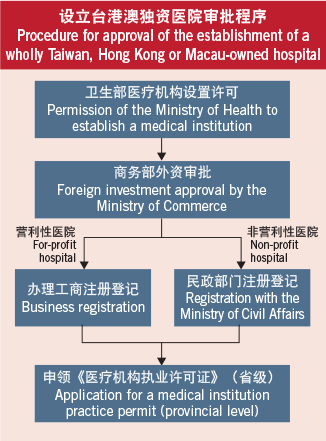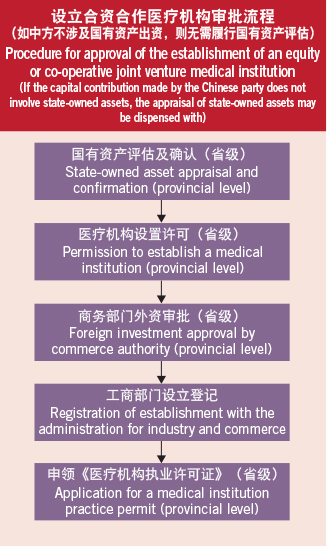With the continuing reform in China’s medical and health system and the issuance of the Notice of the General Office of the State Council Forwarding the Opinions of the National Development and Reform Commission, the Ministry of Health and Other Authorities on Further Encouraging and Guiding Private Capital in the Establishment of Medical Institutions (document No. 58) and subsequent related policies and regulations, China’s policies with respect to the entry of foreign investment into the medical service market have been further relaxed, presenting new opportunities.
Market access

Partner
Concord & Partners
Beijing
Policy-wise, the entry of foreign investment into the medical service sector has undergone a gradual relaxation. Prior to 2000, there was a lack of policy, law guidance and permission for foreign investment. After 2000, foreign investors were permitted to establish Sino-foreign equity and co-operative joint venture institutions in China, provided that the Chinese parties’ equity did not account for less than 30%. Applications for the establishment of wholly foreign-owned medical institutions were denied approval. Since 1 January 2011, Hong Kong and Macau service providers have been permitted to establish wholly owned hospitals in Shanghai, Fujian, Guangdong, Hainan and Chongqing, and Taiwanese service providers were permitted in Shanghai, Jiangsu, Fujian, Guangdong and Hainan. Since 1 April this year, Hong Kong and Macau service providers have been permitted to establish wholly owned hospitals in all municipalities directly under the central government and provincial capitals.
Establishment conditions
Pursuant to the Provisional Measures for the Administration of Sino-Foreign Equity and Co-operative Joint Venture Medical Institutions and supplementary regulations, the following conditions must be satisfied to establish an equity or co-operative joint venture medical institution:
- The establishment and development must comply with the local regional health plan and medical institution establishment plan, and the Ministry of Health’s Basic Standards for Medical Institutions;
- It must be an independent legal entity;
- The total investment may not be less than RMB20 million (US$3.2 million) or, if the investor is a Hong Kong or Macau service provider, the total investment may not be less than RMB10 million;
- The equity of the Chinese party may not account for less than 30%;
- The joint venture term may not exceed 20 years; and
- Other conditions specified by the health authority at the provincial level or above.

It is worth mentioning that on 13 April this year, the Ministry of Health issued the Measures for the Administration of Sino-Foreign Equity and Co-operative Joint Venture Medical Institutions (draft for comment on amendments). The objectives of the draft are to amend and ultimately supersede the provisional measures.
The draft makes relatively substantial amendments to the total investment in, and term of, equity and co-operative joint venture medical institutions, specifying that the total investment in equity and co-operative joint venture medical institutions may not be less than RMB100 million, that the total investment in such medical institutions established in central or western China, or in old revolutionary areas, areas populated by ethnic minorities, border regions or poor regions may be appropriately reduced, but may not be less than RMB50 million, and that the joint venture term may not exceed 30 years.
Difficult issues
Relatively complex approval procedure. Notwithstanding the fact that current policy on the entry of foreign investment into the medical service sector has been further relaxed, it is easy to see that complex approval procedures still need to be navigated to establish equity and co-operative joint venture medical institutions and wholly Taiwan, Hong Kong and Macau- owned hospitals, and the threshold for establishment of these remains relatively high. Not only is joint approval by the health authority and commerce authority at the provincial level or above required, but also equity and co-operative joint venture medical institutions are not permitted to establish branches.

Policy and law bottlenecks still exist in respect of the acquisition by foreign investors of domestic non-profit hospitals. Current regulations and policies are silent on whether foreign investors can acquire non-profit hospitals, and precedents for the approval of such acquisitions are rare in practice. Synthesising the cases in which the author has been involved in recent years, and her inquiries with relevant approval authorities, there remain policy and law bottlenecks to the acquisition of domestic non-profit medical institutions by foreign investors, making approval difficult to secure.
Cindy Hu is a partner at Concord & Partners in Beijing
北京市朝阳区麦子店街37号盛福大厦1930室
Suite 1930, Beijing Sunflower Tower, 37
Maizidian Street, Chaoyang District, Beijing
邮编 Postal code: 100026
电话 Tel: +86 10 85276468
传真 Fax: +86 10 85275038
电子信箱 E-mail:
cindyhu@concord-lawyers.com
www.concord-lawyers.com






















